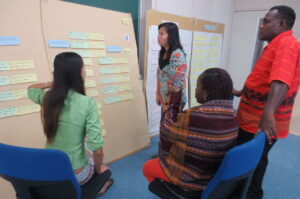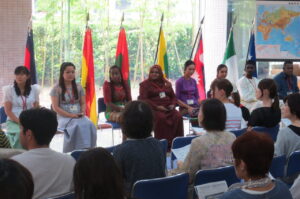 Under a commission from Kyushu International Center of Japan International Cooperation Agency (JICA), the Kitakyushu Forum on Asian Women (KFAW) holds an annual seminar for central and local government officials in developing countries who are in charge of gender mainstreaming policies.
Under a commission from Kyushu International Center of Japan International Cooperation Agency (JICA), the Kitakyushu Forum on Asian Women (KFAW) holds an annual seminar for central and local government officials in developing countries who are in charge of gender mainstreaming policies.
The purpose of the seminar is to foster government officials in developing countries so as to comprehensively and effectively promote gender mainstreaming policies toward a gender-equal society.
In 2014, the seminar was held for four weeks from May 26 to June 20, receiving eight participants from seven countries.
This seminar provides a well-balanced mix of lectures, workshops, site visits and presentations. Participants can learn about administrative measures promoted by local governments and various efforts made by non-profit organizations (NPOs) and private companies. The seminar curricula are designed to help participants comprehensively understand the concepts and methods of gender mainstreaming policies from perspectives of both theory and practice.
The seminar began with a presentation session on gender problems in the participants’ home countries in order to share, discuss and analyze the problems. This helped the participants mutually learn about situations in different countries. Moreover, referring to their experiences, they discussed factors involved and solutions for such gender problems.
Basic lectures and workshops were subsequently held for the participants to obtain the necessary knowledge and methodology to develop effective gender mainstreaming policies. Various examples of gender mainstreaming policies promoted at national and local levels were presented by Japanese government officials and experts, including “CEDAW and Efforts Promoted in Japan” and “Women and Violence.” This program helped them understand the methods for making, implementing, and evaluating plans from the
perspective of gender equality.
 This seminar also included international interaction with citizens of Kitakyushu, which was a good opportunity to directly communicate and discuss gender issues. The participants also visited a nursery school and an elementary school in Kitakyushu, and interacted with the children there.
This seminar also included international interaction with citizens of Kitakyushu, which was a good opportunity to directly communicate and discuss gender issues. The participants also visited a nursery school and an elementary school in Kitakyushu, and interacted with the children there.
The seminar concluded with a presentation of action plans prepared by the participants with Project Cycle Management (PCM) method, which they had learned in this seminar.


